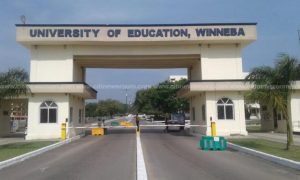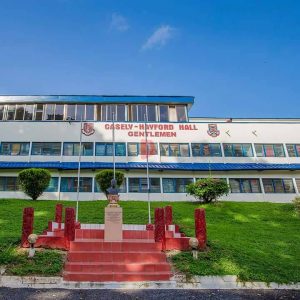 Twenty-two students of the University of Professional Studies, Accra (UPSA) have been dismissed for attempting to manipulate the university’s information system to change their grades.
Twenty-two students of the University of Professional Studies, Accra (UPSA) have been dismissed for attempting to manipulate the university’s information system to change their grades.
At the ninth congregation and special congregation of the university in Accra last Saturday, the Vice-Chancellor, Professor Abednego F. Okoe Amartey, said the Academic Board took the decision to dismiss the students at an emergency meeting on February 15, 2017.
“The Academic Board took a serious view of this conduct, considering the potential it has to damage the credibility of the university, and further resolved that seven of the dismissed students who refused to cooperate with the investigation process should have their photographs published alongside their names to serve as a deterrent,” he added.
The identities of the 22 students were not disclosed by the vice-chancellor.
The Congregation
The congregation was on the theme: “Celebrating professional and scholarly excellence for accelerated nation-building”.
Four thousand and seven students graduated, out of which 280 received diplomas, 3,255 bachelor’s degrees and 472 master’s degrees.
Forty-one graduates obtained First Class honours, 783 had Second Class (Upper Division), 1,204 had Second Class (Lower Division), 926 had Third Class, while the remaining 311 had passes.
History
The UPSA was founded in 1965 as a private professional business institution with the name Institute of Professional Studies and was taken over by the government in 1978 by the Institute of Professional Studies Decree, 1978 (SMCD 200).
It was subsequently established as a tertiary institution with a mandate to provide tertiary and professional education in Accountancy, Management and other related areas of study by the Institute of Professional Studies Act, (Act 566), 1999.
In September 2005, the then institute introduced bachelor’s degree programmes to give meaning to the IPS Act 566.
During the last academic year, the university introduced two new academic programmes — Bachelor of Science in Actuarial Science and Bachelor of Laws (LL.B).
It is likely to introduce Bachelor of Science in Real Estate Management and Finance, Business Economics, Accounting and Finance and Master of Philosophy in Finance in the 2017/2018 academic year, for which accreditation is said to have advanced steadily.
Prof. Amartey said the university had submitted documents to the National Council for Tertiary Education (NCTE) for the accreditation of programmes in Transport and Logistics Management, Public Administration and Doctor of Philosophy in Marketing for onward submission to the National Accreditation Board (NAB) for approval.
He said the university would continue to invest substantially in infrastructure for the purpose of creating the enabling environment for teaching, learning and research.
Appeal to government
Prof. Amartey appealed to the government to reconsider its directive to public universities to cede 34 per cent of their internally generated funds (IGF) to government.
That, he said, was because ceding that percentage to the government would have dire consequences for the finances of the UPSA because the university relied heavily on IGF to operate.
He expressed the hope that more job avenues would be created for graduating students across the country to curb the high rate of unemployment in the country.
He urged the graduands to strive to excel wherever they found themselves.
Academic user fees
In a speech read on his behalf, the Minister of Education, Dr Matthew Opoku Prempeh, said the government had directed tertiary institutions to stick to the 2016/2017 academic user fees until Parliament considered and approved their new rates.
Public universities in the country have increased fees and charges for the 2017/2018 academic year, but the increment has been met with protests by students, parents and guardians.
Dr Prempeh said tertiary institutions should abide by the directive from the NCTE until due process was followed.
He said it was imperative for the universities to comply with the NCTE directive until Parliament considered and made a decision on the proposed fees, in accordance with the Fees and Charges (Miscellaneous Provisions) Act, 2009 (Act 793).
The minister said the government’s commitment in respect of the book and research allowance for lecturers had been released.
He said a draft bill on a national research fund had been prepared and the government was waiting for inputs from key stakeholders to finalise it.
Priorities
Dr Prempeh said one of the immediate priorities to ensure that the educational system was fit for purpose was to put in place effective mechanisms to ensure accountability at all levels of education.
He commended the UPSA for the role it was playing to enhance the human resource base of the country
Honorary degrees
The university conferred honorary doctorate degrees on the Majority Leader in Parliament and Member of Parliament for Suame, Mr Osei Kyei-Mensah-Bonsu; the MP for Nadowli and Second Deputy Speaker of Parliament, Mr Alban S. Bagbin, and a member of the Council of State, Nii Kotei Dzani, for their contribution to the growth of society.
Mr Bagbin, who delivered the acceptance speech on behalf of the other awardees, thanked the university for the honour done them and pledged their readiness to do more for society.
High attrition rate
He expressed concern over the high attrition rate in Parliament, leading to the loss of experienced parliamentarians, noting that that development was a bane to developing Parliament.
He said one required time and effort to learn and grasp the practices and procedures of Parliament.
Source:graphic.com.gh





